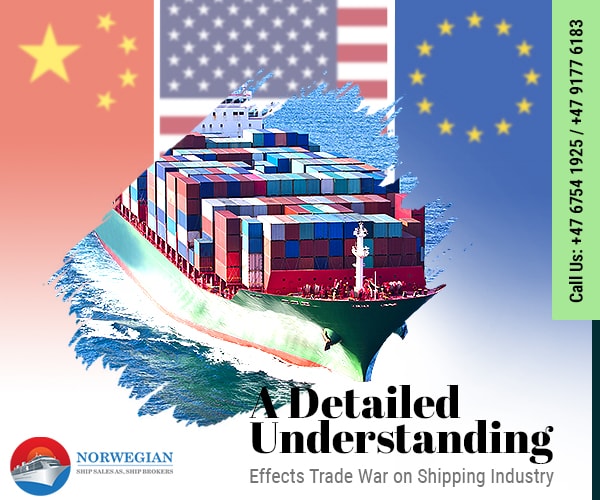The shipping industry has played a pivotal role for centuries in shaping the human society and determining its growth. One of the most effective forms of transport when commercial goods are considered, this mode has helped establish links and build relationships between different countries.
The shipping industry majorly offers two types of services. The first, shipload services that move bulk goods for a few shippers and the second, liner services that carry small shipments for many shippers on a regular schedule.
Most of the vessels are owned by the firms who allow importers or exporters to hire the vessels for shipping goods through the ship brokers. However, the shift in the tendency of the circuit can affect the shipping as a whole. The introduction of the tariffs on shipping goods can change the face of the industry as noted by the experts. This trade war between the US, China and EU can result in a massive change that can shift the course of the industry completely.
Understanding the Trade War
The American President on March 1, 2018, declared new tariff plans for shipped metals, with a 25% tariff on imported steel and 10% tariff on aluminium for all countries in the EU, Mexico and Canada. The tariff has been in effect since March 23 2018. Imposing tariffs on steel and aluminium will have a very little impact on the international bulk trade, however, as BIMCO reports, this could trigger an international trade war that can negatively impact the global shipping industry.
The consequences of levying the tariffs have already started negatively impacting the dry bulk shipping industry. With more such tariffs coming to force during July, the impact can further become severe. Container shipping will be also be impacted, relatively less, but affected nonetheless.
According to BIMCO’s Chief Shipping Analyst, Peter Sand, the principles of free trade results in maintaining peace and prosperity in the world that should be cherished widely. However, he exclaims that introducing restrictive measures in trade can have a negative impact on the shipping industry as a whole.
Looking at The Numbers
The US levied tariffs on a total of 2.3 million tonnes of Chinese exports. 1.9 million tonnes of Chinese containerised goods and 0.5 million tonnes of oil products will be affected as a result. China retaliated to this by imposing tariffs on 128 products from the US that is worth around USD 3 billion. Oil products, chemicals, gases, crude oil, vehicles, containerised goods and dry bulk products will be impacted. As per the reports prepared by the experts, dry bulk products will suffer the most in terms of volumes when the Chinese tariff is imposed.
The countries in EU further announced tariffs on US goods, which have come into force since June 22 2018. This tariff plan proposed by the EU targets the US exports of steel products, cereals, Bourbon and motorcycles.
Canada and Mexico also responded by imposing tariffs on US goods worth USD 12.6 billion. While the tariffs for Canada became effective from July 1 2018, Mexico started levying the same from June 5 of this year.
The silver lining, however, remains that the impact of tariffs from Canada and Mexico on the shipping industry remains low.
Conclusion
Given that the international atmosphere is extremely tensed and full of threats, the retaliation game can be extremely harmful. Major trading partners of the US like China and EU are hitting back to the starting line. The restrictive measures have become a worrying trend for the experts in the global shipping industry. It is only to wait and see how the rising trade war truly impacts the industry.


